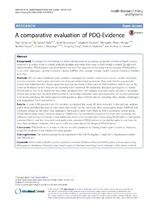A comparative evaluation of PDQ-Evidence
Date
2018Author
Johansen, Marit
Rada, Gabriel
Rosenbaum, Sarah
Paulsen, Elizabeth
Motaze, Nkengafac Villyen
Opiyo, Newton
Wiysonge, Charles S.
Ding, Yunpeng
Mukinda, Fidele K.
Oxman, Andrew D.
Metadata
Show full item recordAbstract
BACKGROUND: A strategy for minimising the time and obstacles to accessing systematic reviews of health system
evidence is to collect them in a freely available database and make them easy to find through a simple ‘Google-style’
search interface. PDQ-Evidence was developed in this way. The objective of this study was to compare PDQ-Evidence
to six other databases, namely Cochrane Library, EVIPNet VHL, Google Scholar, Health Systems Evidence, PubMed
and Trip.
METHODS: We recruited healthcare policy-makers, managers and health researchers in low-, middle- and highincome
countries. Participants selected one of six pre-determined questions. They searched for a systematic
review that addressed the chosen question and one question of their own in PDQ-Evidence and in two of the
other six databases which they would normally have searched. We randomly allocated participants to search
PDQ-Evidence first or to search the two other databases first. The primary outcomes were whether a systematic
review was found and the time taken to find it. Secondary outcomes were perceived ease of use and perceived
time spent searching. We asked open-ended questions about PDQ-Evidence, including likes, dislikes, challenges
and suggestions for improvements.
RESULTS: A total of 89 people from 21 countries completed the study; 83 were included in the primary analyses
and 6 were excluded because of data errors that could not be corrected. Most participants chose PubMed and
Cochrane Library as the other two databases. Participants were more likely to find a systematic review using
PDQ-Evidence than using Cochrane Library or PubMed for the pre-defined questions. For their own questions, this
difference was not found. Overall, it took slightly less time to find a systematic review using PDQ-Evidence. Participants
perceived that it took less time, and most participants perceived PDQ-Evidence to be slightly easier to use than the
two other databases. However, there were conflicting views about the design of PDQ-Evidence.
CONCLUSIONS: PDQ-Evidence is at least as efficient as other databases for finding health system evidence. However,
using PDQ-Evidence is not intuitive for some people.

